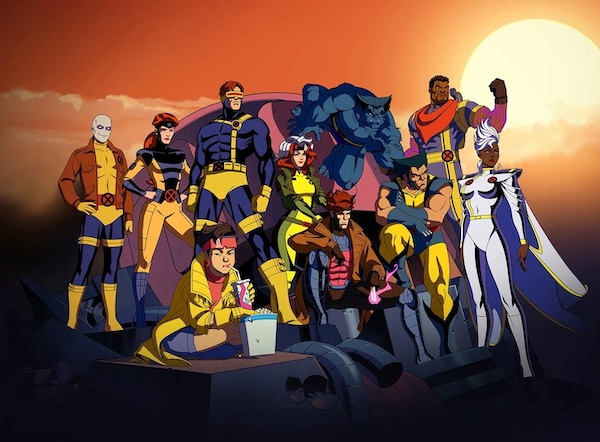
Growing up, my favorite superheroes were the X-Men. After watching the first X-Men movie in 2000, I fell in love with the characters, and as I began to dive deeper into the X-Men universe, I resonated more and more with the challenges these superheroes faced.
For most of my life, I always felt like I was different, and I constantly struggled to navigate and accept parts of myself. I always had a contrarian nature, questioning everything rather than accepting the status quo, and as a person of East Asian descent, this clashed with the societal stigma of standing out. I often faced pressure to conform to rigid rules and customs rather than being different or acting differently.
Through the X-Men, I found solace and hope. The mutant experience speaks to many marginalized identities, directly or metaphorically. I empathized with the struggles of mutants, as they faced the extremes of embracing their identities in a society that shunned them and threatened their survival. As someone who struggled to control my thoughts since childhood, I resonated most with Jean Grey. I often got lost in thought, unable to escape my own world. At times, this felt like the origin story of my own hero’s journey.
X-Men ’97 is a series geared towards adults and could not have come at a better time as it not only reflects today’s world but the human conditions that exist within this complicated world. This comes at a time when increasing conflicts have caused societies to move backward after decades of social progress, when the essence of humanity is wearing thinner than ever. This series addresses many important social issues — prejudice, identity, mental health, family, and more — with genuine love, compassion, and thoughtfulness.
Featuring phenomenal writing, with some of the most memorable quotes highlighted throughout this article, X-Men ‘97 offers exceptional character development, thrilling action sequences, and many valuable life lessons for individuals, families, and society. These lessons will be discussed more in-depth throughout this article.
This is perhaps the best Marvel product that Disney has produced so far—there, I’ve said it.
Disclaimer: Major spoilers ahead!
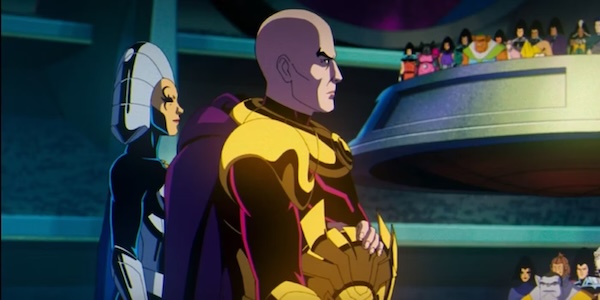
The Crusade Against Systemic Discrimination
At the center of X-Men ’97 is the ongoing struggle of mutants to coexist with humans.
The series portrays mutants facing fear, hatred, and violence simply for being different. This reflects real-world issues of racism, xenophobia, and other forms of discrimination, mirroring the reality of marginalized groups facing violence and prejudice while advocating for equality. This has been the revolving story of humanity — the “us vs. them” mentality, whether the differences are classified by race, religion, political identity, sexual orientation, and more.
As humans born with a special gene that gives them their various abilities and sometimes differences in appearance, the X-Men are often feared and persecuted. But aren’t we all humans born with different genes?
Magneto highlights this sentiment perfectly in his speech to the United Nations:
“In history’s sad song, there is a refrain. Believe differently, love differently, be of different sex or skin, and be punished. We sing this song to one another. The oppressed become oppressors.”
In one episode, Professor Xavier educates the advanced alien race, the Shi’ar, that forcing others to assimilate into their empire is “The rhyme that sells the lie. That we must pillage worth from one another. That for me to be more, you must be less. Your existence against mine.” I find it quite humorous and ironic how this advanced species discriminates against humans, whom they perceive as an inferior form, calling Earth a “Milky Way ghetto”.
X-Men ‘97 shows how anti-mutant sentiment motivates hate groups, exacerbates violence, and influences national and global policy. Yet, the series does a great job of handling this sensitive issue with care, straying away from painting humans as villains. Rather, the X-Men operate on the belief that humans are not evil; they just fear what they cannot understand or control, and as a result, they act out of fear. Sound familiar?
X-Men ‘97 teaches us profound lessons about recognizing and challenging systemic discrimination and the power of media in shaping public perception. It teaches us to stand in solidarity with oppressed communities, for we are all different.
The Moral Path to Justice
Oftentimes, people may share the same goals and ideals but differ in their beliefs on how to achieve them. These are the “imperfect allies” we’ve come to know. The moral path to justice is often messy and complicated, but finding solutions for the sake of our evolution means finding common ground not just with our enemies but also with our allies.
The two leaders, Professor X and Magneto, frequently clash over their methods of securing mutant rights with different approaches — peaceful advocacy versus militant resistance. Magneto wants the best for his race, which is incredibly noble and honorable in its own right. However, what differentiates him from Professor X is that he looks down on humans, views them as lesser beings, and acts with those views in mind. Their ongoing debate forces other mutants to take sides and, at times, fight with each other. Who’s to say which way is the right way?
X-Men ’97 drives home the point about how society today has grown increasingly polarized as well as desensitized to global atrocities. At one point, the villain Bastion says, “When your skin’s not in the game, apathy is your answer.” This sad truth reflects how most of us, who aren’t directly affected by an issue, typically feel apathy toward it. This is especially relevant to current events, such as the ongoing conflict in Gaza.
Despite witnessing with our own eyes the genocide that is destroying millions of innocent lives, the sense of disconnect from these issues causes us to be bystanders. With each side having its own justifications and methods for “righting what’s wrong”, the path to justice here becomes muddled with violence and unspeakable horror. What’s moral about that?
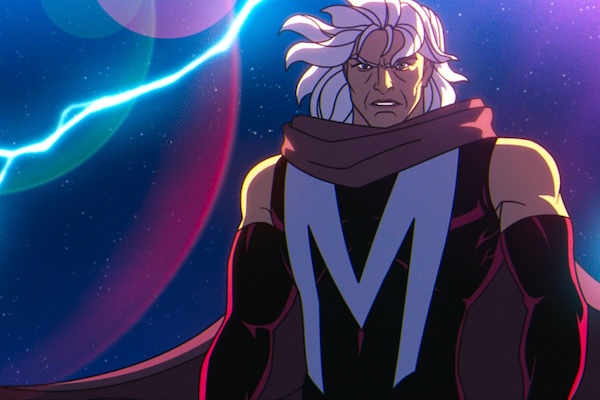
The Vicious Cycle of Retribution
Magneto’s actions and the reactions of the human world show the vicious cycle of achieving victory through violence. This concept is highlighted best in the final three episodes, suitably titled “Tolerance Is Extinction.” After Magneto witnesses the massacre and destruction of the mutant island Genosha, he reaffirms his darkest belief that coexisting peacefully with humans is impossible.
We later learn that the Genosha massacre becomes the “absolution point” for a centuries-long war as Magneto creates a worldwide blackout in retaliation that kills thousands of people. This illustrates the dangers of extremism on all sides, akin to today’s far-right groups rallying and perpetuating hate crimes, and teaches us that achieving lasting peace through violence is elusive, as violence only begets more violence. The lasting repercussions and consequences are burdens that future generations will have to bear.
A poignant exchange occurs between National Security Advisor, Val Cooper, and Magneto:
Val Cooper: “Most other nations don’t allow a terrorist to be their leader.”
Magneto: “Yet so many allow their leaders to be terrorists.”
The fictional genocide in Genosha parallels real-world events, where far-right governments are committing atrocities with impunity, and where many leaders of the West refuse to label the deaths of tens of thousands of Palestinians for what they are.
Beast leaves us with a final point for reflection: “Every moment is a new and shocking valuation of all we have ever been.” When tragedy strikes, how people react serves as a mass evaluation of humanity’s current state. We delude ourselves into believing that the atrocities of the past would never happen today because we think we are better and more evolved. But current events show that this cycle will keep repeating, with future generations looking down on our actions and inactions.
The Journey to Self-Acceptance
Many characters in X-Men ‘97 grapple with their mutant identities along with the physical and emotional challenges they bring. Their journey to self-acceptance, like many of us, requires hardships, reflection, and growth; a winding path that ultimately leads us back to ourselves.
Rogue struggles with her powers that prevent her from physically connecting with others, leading to feelings of isolation and self-loathing. This explains her closeness with Magneto, as his abilities allow her to touch him without hurting him, which she cannot do with anyone else. However, she learns to accept her abilities and realizes that some relationships are “deeper than skin”.
This is also the story arc for Roberto de Costa, who later takes up the moniker, Sunspot. Throughout the first season, he is reluctant to use his powers and actively hides his mutant abilities from his parents and the rest of the world. His fears come to fruition after coming out to his mother, who initially accepts him for who he is. Unfortunately, this happy moment is short-lived, as she tells him that they must hide this from the rest of the world to protect the family’s empire and business relationships.
From here, Roberto learns through his fellow mutants that the path to self-acceptance comes from resonating and connecting with a supportive community of individuals who share the experience of feeling marginalized. This is the core tenet of Xavier’s School for Gifted Youngsters — a haven for mutants ostracized by humanity, where they can feel like they belong and celebrate their unique traits and diversity together.
As Professor X says, “There’s a power in seeing yourself in another, in resemblance.”
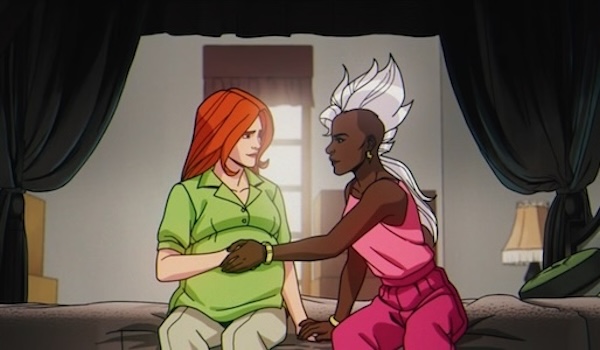
The Emotional Scars of Trauma
Aside from the external threats and battles they must face, the X-Men must also grapple with their own emotional scars and trauma, much like our human experience. “Memories are merely dim images echoing with emotion,” Nightcrawler tells this to Jean as she struggles to deal with her past trauma and mental health.
Jean’s story arc focuses on self-doubt, as she is unable to differentiate her memories from her clone’s, Madelyne Pryor. Jean, who already had her identity stolen by the Phoenix, no longer trusts her mind — the source of her mutant powers — from which she feels disconnected, and this broken connection with her identity strains her marriage to Scott.
Scott grieves the loss of his son, Nathan, and lacks an effective outlet for that distress. He is tormented by having to abandon his son to save his life and by his vow never to be like his father, who was never there for him.
Madelyne, facing the same struggle as Jean, must deal with the trauma and new reality of being a clone. She shows bravery by accepting and making peace with that reality and finding the strength to create a future that is entirely hers.
After Storm loses her powers in a battle, she is forced to face her own trauma and leaves the team to find her new purpose in life. She regains her powers only after overcoming her inner demons. From her lessons learned, she says, “What are demons, but reflections of our fears and shame? Things we bury within us, hide from loved ones, even as they poison our hearts. Until we finally heal our adversary by embracing it.”
Rogue deals with the trauma of being in Genosha during the massacre and the grief of Gambit’s death. In a painful moment, she clutches his lifeless body and echoes, “Sugar, I can’t feel you.” She then faces the challenge of dealing with that grief in destructive ways, for “grief is a lonely war.”
The final episode is a heartfelt discussion of childhood trauma, with Professor X trying to save Magneto by entering his mind before it disintegrates. Magneto confronts his childhood trauma of being in a Nazi concentration camp and witnessing his parents’ death, and how unresolved trauma and festering rage shaped him. Despite their opposing views, Professor X and Magneto have an unbreakable bond due to their shared understanding, respect, and empathy for each other’s hardships. They have supported each other through their pain and suffering, a secret they kept from the rest of the world. Professor X says, “While the tide of our past can drag us under, it also carries us to others who are fighting their own current.”
By portraying characters’ battles with emotional and psychological issues, the series normalizes discussions around mental health and the importance of seeking help and support. The sisterly bond between Jean and Storm exemplifies mutual support, with Jean saying, “Make them mind your weather, sister,” and Storm replying, “And them weather your mind.”
The Endurance of Chosen Family
“It is human nature to crave connection, as it is also mutant nature to be heard, seen, to feel another soul finally seeing yours. Connection is a fragile treasure. One we sacrifice so much to maintain.”
X-Men ’97 preaches an important concept: “Blood is blood. Family is a choice.” Many of the X-Men have fractured relationships with their blood relatives simply due to their genetic differences. They accept those who don’t have anyone to fall back on with loving arms, becoming a family by choice. And despite their diverse backgrounds and sometimes conflicting personalities and viewpoints, they must work together to overcome threats. Through the hardships they face together — whether from a society that alienates them or from the threat of powerful enemies — they forge an unbreakable bond, stronger than those from their biological families.
Many people struggle with their own family dynamics, as everyone grows up believing their family is always supposed to be there for them and give them unconditional love. I resonated deeply with this concept, having experienced how little meaning blood can sometimes hold in my own biological family, especially as hardships arise. It was a harsh wake-up call when I realized that those idealistic expectations did not match reality. But this paved the way for the possibility of my own chosen family where I have agency in creating the bonds that are, in many ways, stronger than my biological family.
The diverse roster of the X-Men includes characters from various ethnic backgrounds and abilities. It features strong female leaders and role models like Jean Grey and Storm, reinforcing the idea that diversity is a strength and allowing society to learn from various experiences and perspectives. Teamwork also requires diverse abilities as different mutants with different abilities working hand-in-hand can overcome the greatest threats.
This commentary sharply contrasts the growing state of xenophobia today — the mentality that “the more room we make for your kind, the less we leave for ours.” Too often, immigrants are blamed for a country’s problems that, in reality, stem from poor governance and mismanagement of resources. Rather than embracing everyone’s differences and viewing that as a strength to maximize upon, our society tends to reject those differences, and as a result, we are weaker for it.
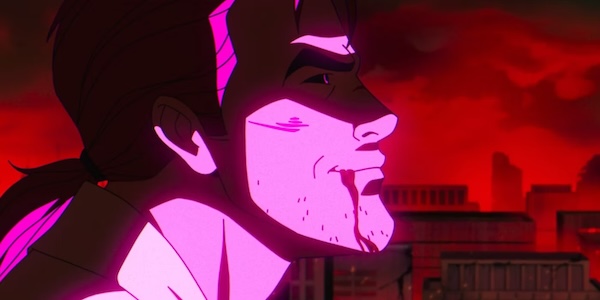
The Weight of Sacrifice
In essence, the entire story of the X-Men revolves around their willingness to put their lives on the line to protect a world that fears them, exemplifying heroic sacrifice. Xavier’s School teaches its students and us, the viewers, about the importance of responsibility, altruism, and standing up for what is right, even at a great personal cost. We see this time and time again as each character battles with making these sacrifices.
Cyclops and Madelyne Pryor’s sacrifice is a major example, one any parent would pray to never bear. They wanted to leave their duty as X-Men behind to have a peaceful life raising their baby son, Nathan. However, they sacrifice their time with their son by sending him into the future to find a cure for a virus destroying his health. They forfeit their chance to be parents to honor their duty of protecting civilians.
Gambit’s sacrifice cost him his life, as he sacrificed himself to end the destruction in Genosha. This highlights that true heroes often make personal sacrifices for the greater good, inspiring others to act with similar integrity and courage.
Even amid the pain and suffering humanity throws at them, the X-Men continuously choose to show love to their human counterparts by protecting them. Perhaps this is one of the greatest lessons of all; that acting with love, compassion, and empathy despite the darkness that surrounds us is the right thing to do. “There is no love without sin, for love is best measured in what we forgive,” says Nightcrawler.

